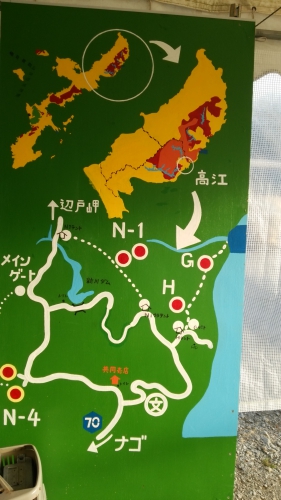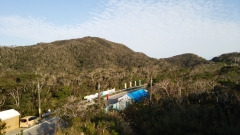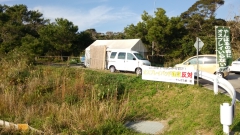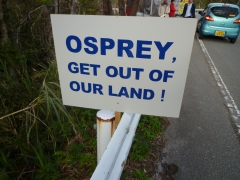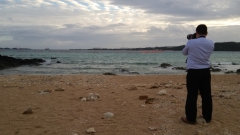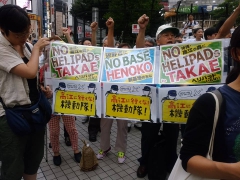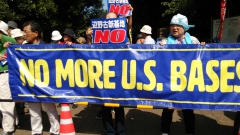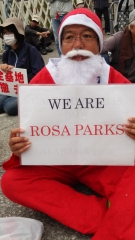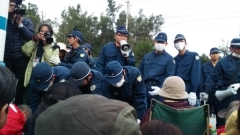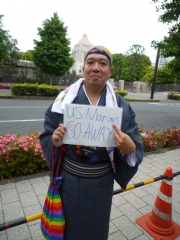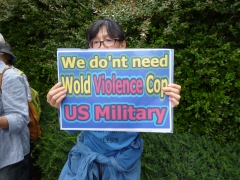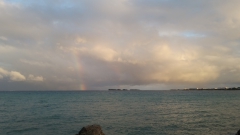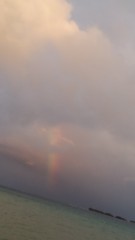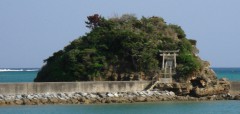29 July 2016
US Marine helipad construction drives precious forest and human destruction, We'll "Try Everything" to stop that!
It is happening in Takae district, Higashi Village, Okinawa Island Prefecture, southernmost tropical region in JAPAN. The population of the prefecture is about 1.4 million. 3 hour flight from Tokyo. Kind of remote from main 4 islands of Japan. It is like Hawaii in U.S.
In exchange for return of some portion of US Marine training area indicated in dark red, they demanded building 6 new helipads in the forest near Takae district (circled area), residence of 150 people. The locals have been fighting against the construction project for years. They set tents at gates of construction sites as barricades.
If the new helipad construction is completed, their residential area would be surrounded by helipads of ospreys that cause bigger noise and more frequent accident occurance than helicoptors because of defects of the structure.
Helipads for ospreys are bigger than helicopters and destroy bigger areas of the forest. The forest is where endangered birds such as Yanbarukuina and Noguchigera inhabit. Not just forest destruction but big noise and heat waves can potentially threaten their lives. The heat waves ospreys release burn grasses on the ground.
2 of 6 helipads N4 were completed already and have been used even though the agreement states new ones would be used after all of them are completed. Then what happened is noise level of Takae district rapidly increased, tens of times more than before. 11 year-old boy got sick and had to evacuate from his local community.
Okinawa had been occupied by US military force between 1945, end of Pacific War and 1972. During Vietnam war, Takae residents were used as VetCon target in the simulation training by the military. Agent Orange may have been sprayed there.
Even after return to Japan, US military bases have remained based on US-Japan defense treaty, agreements between two soreveign nations. In 1996, US and Japanese governments agreed to return some areas of the bases to former land owners and Okinawan communities. But return plans come with relocation plans. Even the military occupied areas is shrunk, the base function gets bigger by providing new bases. Other case is Henoko-Oura bay sea located seaside of Camp Schwab landfill project for the relocation of Futenma base. A beautiful coral sea, where endangered specie, marine mammal dugongs inhabit. This issue have been discussed many time on this blog. Please check articles in Okinawa tag. This article is a good description of the issue.
These plans have been met with local protest. Majority of locals dissapprove the plans. Governor of Okinawa Prefecture, Onaga and mayors of Nago city, where Camp Schwab is located, majority of Okinawa prefectural assembly members and all elected members of Japan's parliament from Okinawa constituencies express objection to the landfilling and new base construction plan. As for Takae, last week the construction work resumed, Okinawa assembly made a resolution that the construction should be halted.
Okinawans are fighting against US military and Japanese government that follows its demands.
Last week Japanese government dispatched hundreds of police officers from mainland to suppress local protestants that kept on sit-in at the gate of N1 construction site. Their sit-in protest was once dissolved and their tents and cars as barricades were taken away forcibly but the protest still continued.
Civil activists from all over Japan, and around the globe are backing this. Even in Tokyo, protest activities are going on. Mainstream media reported these events and more people learnt what is going on. Sorry, Americans, more Japanese hate your country.
I want to give this song to protestors including myself. "Try Everything" to stop that! The forest is in fact zootopia. There may be monsters like PokeMon! They will "Try Everything" to stop destruction of their world.
00:43 Posted in Ecology, Japan News, Music, Politics, USA issues | Permalink | Comments (3) | Tags: okinawa, military, human rights
23 January 2016
Being Rosa Parks at US Marine Camp Schwab in Okinawa
From last December to beginning of this month, I was in Okinawa to join protest activities of locals who are opposed to construction of new military base runways in US Marine Camp Schwab in Nago city, Okinawa.
Why we are opposed has been described in this blog for years. Please read the posts clicking the tag Okinawa.
Especially, this article gives you outline of what is going on there. My letter to US Ambassador to Japan, Caroline Kennedy, daughter of JFK.
While I joined the protest, I used picket board that says "We are Rosa Parks."
Rosa Parks as you may know, is the symbol of refusal to unjust matters. A Black woman who refused to give front seat to white passengers in a bus and was arrested in Montgomery, Alabama, 1955. But her action sparked bus boycott protest led by Dr. Martin Luther King. 9 years later, civil rights Act was passed. A year after that, Dr. King led peaceful march from Selma to Montgomery to call for enactment of voting rights bill. Black people in the Southern states were blocked at voting registration office.
What surprised me was marines reaction to the picket board. Young marines looked positive. I asked one security guard, who was a young white man inside the camp premise, if he knew what it meant. He said smilingly "I know what it means." One Black man driving a car looked at me, smiled and gestured his support. "Rosa Parks" is known to every American.
I saw the movie, "SELMA" after I got back home in Tokyo. It was a great movie. I found how hard it was for him to do this. A lot of people were hurt and even killed. But he and his followers never gave in.
Interesting thing to know was Dr. King was a very smart man so that he once retreated the march to avoid bloodshed by local police. He filed lawsuit against the Alabama state that bans peaceful march. Then the court made an order to allow the march. He prevailed.
Just like Rosa Parks and Dr. King. we did peaceful protest at the gate of Camp Schwab. Sit-in-protest at the gate that construction vehicles passed through.
Police came and took us from the gate. We never foughtback but just kept sitting down on the ground. I was carried by the police from shoulders to toes.
Protestants do every day. It has been going on for years. There were several injuries and arrests. But we still keep doing this. We cannot stop the construction but at least we are delaying that. We will never give in.
While I joined in the sit-in protest, I really felt like Rosa Parks, Dr. King and their followers in their times. We may be backed up by their souls.
Thank you, Dr. King and Ms. Rosa Parks. I am proud of being part of this protest activity.
The US government should hear the voice of protestants and halt such stupid construction project. It is as stupid as segregation laws. It is actually what is happening in your own yard.
15:28 Posted in Ecology, Film, Japan News, Politics, Society, US-Japan relationship, USA issues | Permalink | Comments (0) | Tags: history, military, okinawa, racism, afro-american
01 June 2015
Film "Pride" The oppressed united
I just happened to know this film while participating in Tokyo Pride Parade event.
It was British movie. The Japanese title was "Parade e Yokoso (Welcome to the Parade)"
The story is based on facts. In 1980's coal miners did strike against Thatcher adminisitration's policy to close down unprofitable mines.
Gay activists in London launched fund-raising campaign named "Lesbians and Gays support miners."
At first they were not accepted by miners' community but later on both sides understood significance of corporation getting over the difference. Like one of important characters said "You support us so we support you."
In the end, miners joined gay parade to show solidarity with the activists.
The both oppressed communities got united to help each other.
I recently came up with the idea of new novel using the concept of unification among oppressed communities. Gays are not the only oppressed but women, disables, and recently those who are fearing new foreign military base construction in their local prefecture, Okinawa, Southernmost prefecture of Japan. For details, please read the articles tagged Okinawa in this blog.
The mining town in the film was in Wales. It was several hour drive from London but very different culture and people exist, even language is different. One different tribe in one nation. That thing is very much like Okinawa.
I kind of do the similar action to the film, helping that prefecture people. On 24 May 2015 I joined protest activity such as human-chaining demonstration around Japan's Diet building in order to show solidarity with them.
Last year I saw the rainbow on the construction area. It appeared from the sea. The construction project is reclaiming the beautiful coral sea. It was on the same day after I attended Okinawa's gay pride event.
Well, it seems another oppressed ones got united helping each other for the better future.
Just my fantasy?
31 July 2014
Puff the magic dragon, lived by the sea, in the land called "HENOKO"
I saw the dragon there, in Henoko, Okinawa prefecture, southernmost chain of the islands in Japan.
You might not believe that. This is the proof.
Yes, it looked like rainbow. But the sea is known to be sacred place for the dragon. The locals worship it and established a shrine on the sea coast.
Recently the dragon seems not very comfortable living there because of construction project going on his or her place. On the sea coast is US Marine training camp base, Camp Schwab. There is a plan to expand the base by reclaiming the sea where he/she lives.
The locals oppose the plan because their environment would be deteriorated as well. However, US military and the Japanese government never mind local resisitance movement.
Will he/she leave as the things are? I doubt it.
The sea reminds me of what I experienced 3 years ago in Kaminoseki, Yamaguchi prefecture in the mainland of Japan. Actually I learnt about that town when I joined environment activists meeting in Henoko. I met Kaminoseki activists who protest the construction project that reclaims the sea to build nuclear power plants there. They did the same things as locals in Henoko do, kayaking the sea to prevent construction work from proceeding.
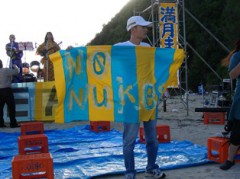
So I visited Kaminoseki later. There I saw the same scene.
Activists on the beach calling for the halt of the project but the authorities and power company never minded their voices. The project was about to be proceeded and the beach might be destroyed sooner.
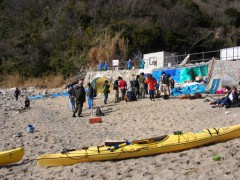
I felt something when I was on the beach. I sympathized, and then prayed to call for the help.
Two weeks later a big earthquake and tsunami occurred in Fukushima. 4 nuke plants were destroyed by the nature and massive radioactives were released to the environment.
Now the construction is halted in Kaminoseki (not yet terminated.) No nuke plants are operated in Japan at present.
In that town, there enshrined the sea dragon.
Was it just an coincident? I just don’t think so. That is why I’ve been feeling fear.
20:06 Posted in Ecology, Japan News, Music, Travel, US-Japan relationship | Permalink | Comments (0) | Tags: military, okinawa, nuclear power






